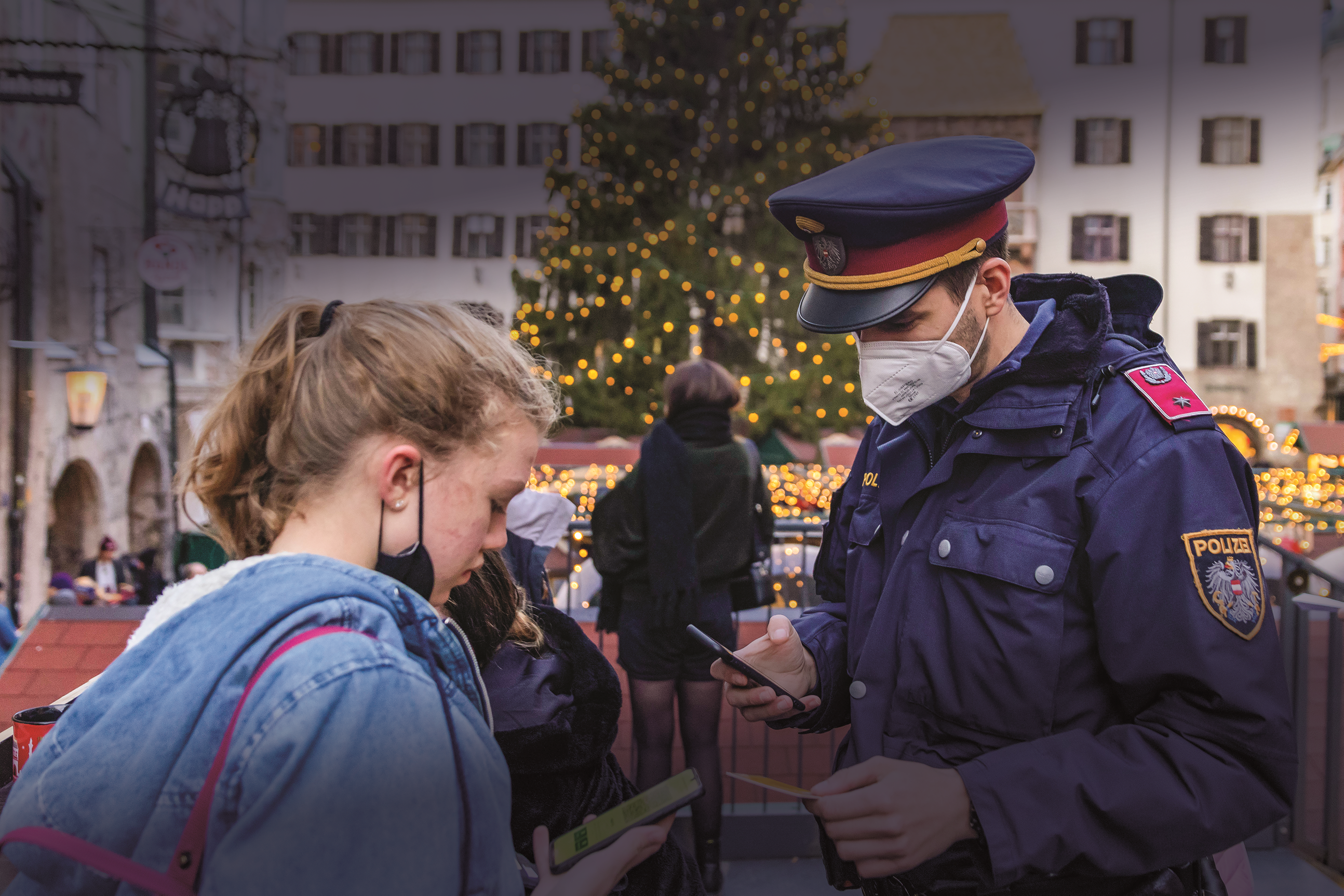Features
Europe: No Clear Pathway Ahead As Pressure On Unvaccinated Mounts

Jan Hetfleisch/Getty Images – Police officers in Innsbruck, Austria
Caption: Police officers in Innsbruck, Austria, monitor compliance with the lockdown for people not yet vaccinated. The COVID protocol went into effect in November.
For the European live entertainment sector, the new year begins just as it ended: full of uncertainty. Some countries began to move quite aggressively towards banning unvaccinated people from certain public events, which creates new challenges for a business that relies on full capacities to turn a profit. It also raises questions about individual freedom and personal choice, which used to go hand in hand with culture in general.
Austria was the first country in Europe to effectively introduce a lockdown of the unvaccinated. Only people with proof of vaccination or recent recovery are currently allowed inside cultural and sports events as well as restaurants and other hospitality businesses – the latter were also facing a 10 p.m. curfew at press time. Seated indoor and outdoor events are limited to 2,000 people, if all guests can produce proof of having received the booster as well as a negative PCR test. The capacity is reduced to 1,000 if the audience has only had the first two vaccines plus a negative test, and further reduced to 500 if proof of vaccination or recovery are the only entry requirements.
Other European nations are on a similar trajectory. French President Emanuel Macron caused a stir when he told Le Parisien in a recent interview that he wanted to “hassle” the unvaccinated by making their lives harder. Tobias Hans, prime minister of the German state Saarland, said during a German TV talk show that it was important to send a clear message to the unvaccinated: “You’re now out of public life,” he said. Italy has introduced a so-called Super Green Pass. As opposed to the normal Green Pass, which allowed people to provide proof of a negative COVID test taken within 48 hours to access venues, the Super version requires proof of vaccination or recent recovery from COVID. In the Netherlands, new restrictions led to the cancellation of ESNS in January, which will take place as an online-only event for a second year running. Protests against coronavirus restrictions, particularly against the division of society along health-related lines, are currently a regular occurrence in most of Europe.
Wherever new restrictions are introduced, governments point toward rising COVID case numbers. With Omicron, one factor that may be contributing to the surge in cases is the fact that people are testing more than ever. The UK reports shortages of testing kits on a regular basis. In countries like Germany, many professionals, whether working in health care or not, are being asked by their superiors to provide negative tests on a regular, sometimes daily, basis. As former German health minister Jens Spahn pointed out early in the crisis, one had to be cautious not to be testing too much, as the inevitable number of false positives would skew the picture.
What is more, as Anthony Fauci, Chief Medical Advisor to the President of United States, said in a recent interview with MSNBC: “PCR doesn’t measure replication competent virus. It measures viral particles. So in other words, I could be infected, have cleared the replication competent virus from me, but I can continue to be positive with a PCR for several days after recovering and not being transmissible at all. … [PCR tests] measure the presence or absence of the virus. And the virus could be dead, enactive inactive virus that doesn’t transmit.” Therefore, you may have a great number of positive results from people who have already recovered and pose no risk to others.
At press time, there was hardly a country left in Europe that didn’t have capacity restriction, irrespective of the venue size or whether it was indoor or outdoor. One thing that’s become clear is that capacity restrictions make the staging of events economically unviable. Banning the unvaccinated further rids promoters of significant parts of their audience. Finally, the coverage of coronavirus in most media reduces confidence in some patrons, who might choose to stay at home even after restrictions lift. This style of coverage is particularly bewildering given the evidence that the Omicron variant is having a far milder impact compared to its predecessor. UK prime minister Boris Johnson told press on Jan. 3 that the Omicron variant was “plainly milder,” which is why he didn’t plan any new restrictions for England, the only place in Europe with no restrictions on social gatherings. UK artists are therefore focusing on local tours. James Bay, for instance, played a few intimate shows to just a few hundred people in grassroots venues last summer, and decided to turn this concept into a whole UK tour in early 2022. Soul singer Corinne Bailey Rae announced her first headline tour of the UK since 2016. The 10-date UK trek starts in Cambridge, April 20, and finishes in Bath, May 4.
Between the UK and mainland Europe, Brexit has added another layer of bureaucracy on top of coronavirus related restrictions, making travel very costly for young acts traveling with gear. But even the big names are mostly refraining from plotting anything concrete, seeing that travel, capacity and other relevant restrictions vastly differ from country to country. Plus, each country’s quarantine requirements for artists and crew testing positive can disrupt schedules way too much.
The CEO of the UK’s Night Time Industries Association, Michael Kill, summed up how most working in the European live entertainment business will feel at the moment: “Businesses are failing, people are losing their livelihoods and the industry is crippled. Mixed messaging, coupled with additional restrictions, have had a catastrophic impact on our sector. At this critical point, we need strong leadership and a clear pathway from government with a long-term strategy for new COVID variants. The open/close strategy is crucifying businesses.”